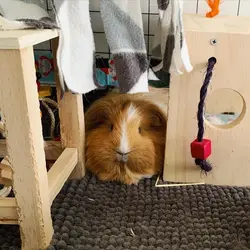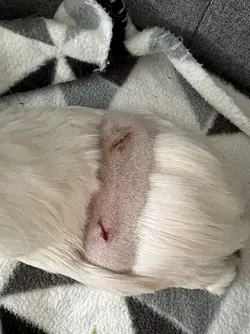Hi
Ovarian cysts in sows are very common; especially the older they get. Guinea pig sows are biologically only laid out for a life span of around 3 years but as very few sows would survive for longer there was no biological need for a menopause. This means that in our pet piggies high hormone output never stops all life long - hence the propensity for cysts.
The majority of ovarian cysts are non-hormonal fluid filled ones. They are generally harmless and do not cause any symptoms but they can grow massively in older age and can cause secondary problems by pressing on other organs or - if you are very unlucky - causing gut adhesions. These cysts appear, grow and become the more common the older sows get. Most older sows are likely to have them although the majority will go unnoticed because they do not cause any problems.
The second largest groups but actually a minority of cysts are the 'classic' hormonal ones that cause the visible and behavioural issues. They can appear earlier and later but they are most typically active around age 2-4 years.
A very few cysts can grow cancerous. If you have bleeding from the anus in a sow, please always see a vet because it is generally from a cyst gone rogue. Cysts that feel hard to the touch in an examination (i.e. not fluid filled) can also turn cancerous in older age.
There are four ways that ovarian cysts can be tackled:
- full spaying operation (i.e. removal of the complete reproductive tract, including the womb, which can occasionally go wrong as well although not as often as cysts)
- ovarectomy (the removal of just the ovaries from the back)
- hormone treatment by injection (more commonly used in the UK) or implants (preferred treatment method in the USA). May need 1-2 rounds of treatment.
- draining of large fluid filled cysts in frail older sows (needs to be done carefully, ideally under a scan) but is not as invasive and the effect will last for a good number of months although it is not a permanent solution.
At the moment, our own stance is still a bit on the fence since operative removal is a major operation that can go wrong so the risk/benefit balance in elective early removal is not quite right for many of our members. It is currently an area that is still debated and researched so things may change in the future.
Once you have an acute cyst problem, either through disruptive behaviour or from large cysts, then intervention will be a matter of necessity. In the case of bleeding or infection in reproductive tract (strongly stale smelling fluid can point to an infection in reproductive tract and not always in the urinary tract), potentially life-saving action needs to be taken promptly.
So far, the sows needing medical or operative intervention in older age are still in the minority and the situation has relaxed a little with the advent of hormone treatment some years ago.
We can't tell you whether to operate or not; we can only lay out the pros and cons for you to make as informed a decision as possible. Crucial is how much you trust your vet.
Sows: Behaviour and female health problems (including ovarian cysts)
PS: Is your vet treating with an antibiotic as very smelly urine is a sign of infection?
As to the sludge in the urine, please review your diet and keep in mind that vegetables make only about 15-20% of the daily food intake, so you need to look at all food groups from the water, pellet amount to veg choice as there is little you can do with the staple hay (which makes around 75-80% of the daily food intake).
Long Term Balanced General And Special Needs Guinea Pig Diets

